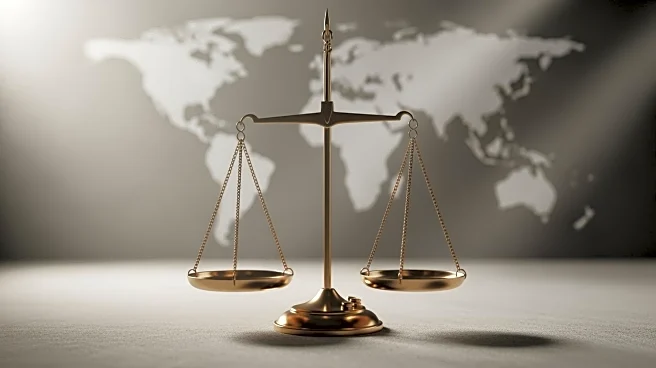What's Happening?
The International Court of Justice (ICJ) has issued an advisory opinion stating that Israel must permit the United Nations Relief and Works Agency (UNRWA) to deliver humanitarian aid to Gaza. This decision
follows a request from the U.N. General Assembly, which sought clarity on Israel's legal obligations after it effectively banned UNRWA from operating in the territory. The ICJ's ruling emphasizes Israel's duty to facilitate relief efforts by the U.N. and its entities, including UNRWA, which has been unable to bring supplies into Gaza since March. Despite the ban, UNRWA continues to provide essential services such as health care, sanitation, and education within Gaza. The ruling comes amid a fragile U.S.-brokered ceasefire in Gaza, which aims to end a two-year conflict. Israel has rejected the court's opinion, citing bias and security concerns related to UNRWA's alleged ties to Hamas.
Why It's Important?
The ICJ's ruling holds significant implications for international humanitarian law and the operations of U.N. agencies worldwide. By mandating Israel to allow aid into Gaza, the decision could alleviate the dire humanitarian situation faced by Palestinians, who suffer from severe shortages of food and medical supplies. The ruling also underscores the legal responsibilities of nations under international law, potentially influencing future U.N. missions and their ability to operate in conflict zones. For Israel, the decision challenges its stance on security and its relationship with international bodies, potentially affecting diplomatic relations and its approach to humanitarian issues. The ruling may also impact the broader geopolitical dynamics in the region, as it pressures Israel to comply with international norms while balancing its security concerns.
What's Next?
Following the ICJ's advisory opinion, the U.N. and international community may increase pressure on Israel to comply with the ruling and allow humanitarian aid into Gaza. The decision could lead to diplomatic negotiations aimed at ensuring the delivery of aid and addressing Israel's security concerns. Additionally, the ruling may influence ongoing legal proceedings, such as those initiated by South Africa accusing Israel of genocide in Gaza. The ICJ's opinion could bolster arguments against Israeli leaders, including potential legal actions related to the restriction of aid. As the situation evolves, stakeholders including U.N. agencies, humanitarian organizations, and governments will likely engage in discussions to facilitate aid delivery and address the humanitarian crisis in Gaza.
Beyond the Headlines
The ICJ's ruling highlights the complex interplay between international law, humanitarian aid, and national security. It raises ethical questions about the responsibilities of nations to uphold human rights and provide for civilian populations in conflict zones. The decision also reflects broader challenges faced by international organizations in navigating political tensions and ensuring effective aid delivery. Long-term, the ruling may influence global perceptions of Israel's policies and its adherence to international norms, potentially affecting its diplomatic standing and relations with other countries. The case underscores the importance of legal frameworks in addressing humanitarian crises and the role of international courts in shaping global policy.











